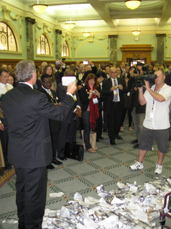| | among divergent parties on Capitol Hill. It makes confusion an easy tool. Politicians of all stripes try to take advantage of general ignorance by sleight of hand. For instance, this week the administration didn’t have to take down important web sites that provide data or information on government services, while conveniently leaving up sites that promote its side in the dispute. It wouldn’t take much manpower to keep databases accessible while guarding against hackers. But by mid-week, census.gov contained only a terse statement about how its sites are down because of the shutdown, while whitehouse.gov contained a statement about how Congress was responsible for the pain, along with helpful links explaining the virtues of Obamacare. And the guards who tried to stop aging veterans from visiting the WWII memorial in Washington could just as easily have been there to protect people who wanted to visit the outdoor site. But that wouldn’t have inflamed a public that might actually view photos of a standoff on Facebook or some other social media site, briefly distracting them from impassioned discussions on the final episode of Breaking Bad. For their part, Republicans tend to view the upcoming deadline to raise the debt ceiling as if it is permission to borrow more, rather than to pay off what already has been borrowed. Many of you reading this column do not fall into the category of the ignorant and confused. Surveys consistently show that those things decrease in proportion to one’s level of education. But I often am surprised. One friend I admire lamented in a recent casual conversation that he can’t understand why the government doesn’t cut its budget for foreign aid, which he assumed would make a dent in the current fiscal impasse. It’s a commonly heard complaint. A survey by World Public Opinion found in 2010 that people believe about 25 percent of the federal budget goes to help foreign governments. Maybe they get this from all the news reports on conflicts abroad or infomercials on starving children. The truth, however, is that only about 1 percent of the federal budget goes toward foreign aid. The overwhelming majority of federal revenues go toward Social Security, Medicare, Medicaid and the military, and people tend to react strongly when Washington wants to cut one of those. That’s why the current impasse doesn’t shut down those programs, nor is anyone talking about how to reform them, which would get to the heart of the nation’s real long-term problems. Two years ago, Newsweek and the Daily Beast tried to examine why Americans are ill-informed. Noting that polls show European citizens tend to understand international events to a larger degree than folks here, senior writer Andrew Romano quoted experts who said perhaps our complicated system of government, with its many state and local jurisdictions, might be to blame. He quoted NYU sociologist Dalton Conley explaining that income inequality was a reason. The poor don’t have access to the same kind of education as the wealthy, and schools differ from state to state. Certainly, poor schooling makes a difference, but these sound like excuses rather than explanations. Americans today have more freedom and more access to information than ever before. No longer do they have to rely on a station executive to set their viewing schedules. They simply choose to be ignorant about certain things. But as Romano noted, ignorance is not something new. We’ve always had trouble identifying our representatives and school board members, let alone explaining the three branches of government in Washington. It’s just that we’ve never had fewer excuses to be uninformed, and it’s never been more important. Education ought to trump blind partisanship every time, but if politicians know they don’t have to worry about the one, they will rely solely on the other, and that won’t lead to the best solutions. |
|
0 Comments
Your comment will be posted after it is approved.
Leave a Reply. |
Search this siteLike what you read here? Please subscribe below, and we'll let you know when there is a new opinion.
The author
Jay Evensen is the Opinion Editor of the Deseret News. He has more than 40 years experience as a reporter, editor and editorial writer in Oklahoma, New York City, Las Vegas and Salt Lake City. He also has been an adjunct journalism professor at Brigham Young and Weber State universities. Archives
July 2024
Categories
All
Links
|


 RSS Feed
RSS Feed

